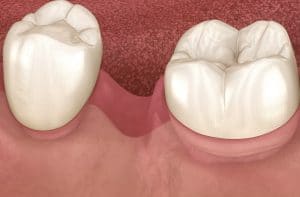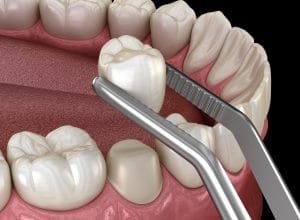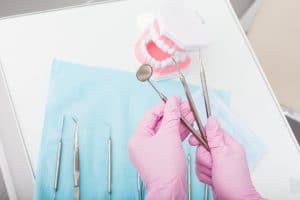 The fact that your dentist recommends root canal treatment to save your tooth may seem like all you need to know about the condition. If you undergo treatment as soon as possible, then it may be all you need to know, along with how to care for and preserve your tooth and smile in the future. However, it’s natural to take time to consider what needing root canal treatment means for your tooth and oral health, and what could happen because of it. Today, we help clear up these questions by explaining a few implications of needing root canal treatment to save your tooth. (more…)
The fact that your dentist recommends root canal treatment to save your tooth may seem like all you need to know about the condition. If you undergo treatment as soon as possible, then it may be all you need to know, along with how to care for and preserve your tooth and smile in the future. However, it’s natural to take time to consider what needing root canal treatment means for your tooth and oral health, and what could happen because of it. Today, we help clear up these questions by explaining a few implications of needing root canal treatment to save your tooth. (more…)
Why Replacing Lost Teeth Is So Important
 Treating any dental health concern that develops is the key to minimizing the problem’s overall impact on your oral health. For example, if you develop gum disease, then treating it early will prevent it from increasing your risks of losing one or more teeth. When it comes to tooth loss, however, the potential impacts to the rest of your smile are much more significant than most other oral health concerns. Today, we examine why, and what makes it so important to replace lost teeth as soon as possible for the good of your immediate and long-term oral health. (more…)
Treating any dental health concern that develops is the key to minimizing the problem’s overall impact on your oral health. For example, if you develop gum disease, then treating it early will prevent it from increasing your risks of losing one or more teeth. When it comes to tooth loss, however, the potential impacts to the rest of your smile are much more significant than most other oral health concerns. Today, we examine why, and what makes it so important to replace lost teeth as soon as possible for the good of your immediate and long-term oral health. (more…)
Different Kinds of Problems a Dental Crown Can Solve
 One of the biggest reasons why dental crowns have been around for so long is because they’re highly effective. That’s especially important given the fact that their purpose is to restore and save teeth that have become compromised in different ways. Today, modern dental crowns can address a wider variety of concerns than ever, thanks to their more precise design and the use of more lifelike materials. For example, with the right custom dental crown, we can help resolve problems that may include damaged, weakened, or lost natural tooth structure. (more…)
One of the biggest reasons why dental crowns have been around for so long is because they’re highly effective. That’s especially important given the fact that their purpose is to restore and save teeth that have become compromised in different ways. Today, modern dental crowns can address a wider variety of concerns than ever, thanks to their more precise design and the use of more lifelike materials. For example, with the right custom dental crown, we can help resolve problems that may include damaged, weakened, or lost natural tooth structure. (more…)
How Much Tooth Decay Can a Filling Treat?
 Treating tooth decay is one of the most frequent reasons for people to need restorative dental treatment. The concerning about this is that it means a majority of people will have to deal with it at some point in their lives, if they haven’t already. However, the good news is that it means more people are treating their tooth decay and cavities early, and saving more of their healthy tooth structure in the process. Today, we examine how modern tooth fillings make cavity treatment more efficient, and why the extent of your tooth decay matters when it comes to treating it. (more…)
Treating tooth decay is one of the most frequent reasons for people to need restorative dental treatment. The concerning about this is that it means a majority of people will have to deal with it at some point in their lives, if they haven’t already. However, the good news is that it means more people are treating their tooth decay and cavities early, and saving more of their healthy tooth structure in the process. Today, we examine how modern tooth fillings make cavity treatment more efficient, and why the extent of your tooth decay matters when it comes to treating it. (more…)
Getting Help for Your Chronic Snoring Habit
 When you consider the kinds of things your dentist can help you address, you may not think your chronic snoring habit should be included in them. However, for many people who suffer from chronic snoring, a visit to the dentist could be the first step in finally finding a solution to stopping it. Today, we explore what could be contributing to your snoring, why it’s important not to ignore it, and what your dentist may be able to do to help you sleep soundly and peacefully each night. (more…)
When you consider the kinds of things your dentist can help you address, you may not think your chronic snoring habit should be included in them. However, for many people who suffer from chronic snoring, a visit to the dentist could be the first step in finally finding a solution to stopping it. Today, we explore what could be contributing to your snoring, why it’s important not to ignore it, and what your dentist may be able to do to help you sleep soundly and peacefully each night. (more…)
Could Headaches and Migraines Mean You Have TMJ Disorder?
 When many people experience a headache, they don’t often consider it a sign of something more serious. Once the pain subsides, the memory of the headache and worry of what it might mean can often fade away, as well. However, if your headaches return often, or get increasingly worse until they develop into migraines, then you might start to wonder more about why. For many people, seemingly random headaches and migraines can actually be signs of a less obvious jaw dysfunction, also known as TMJ disorder. (more…)
When many people experience a headache, they don’t often consider it a sign of something more serious. Once the pain subsides, the memory of the headache and worry of what it might mean can often fade away, as well. However, if your headaches return often, or get increasingly worse until they develop into migraines, then you might start to wonder more about why. For many people, seemingly random headaches and migraines can actually be signs of a less obvious jaw dysfunction, also known as TMJ disorder. (more…)
Why Minor Tooth Damage Should Be Fixed As Soon as Possible
 In many cases, it can be easy to try to and gauge the severity of an oral health concern by what you can see and feel. For example, if you notice a small piece of your tooth has chipped off, or a light crack has developed in its surface, then it might seem like a minor concern for your oral health in general. Unfortunately, this common mistake often leads to seemingly minor tooth damage becoming much more severe before patients finally seek treatment to restore it. Today, we examine why you should treat all forms of tooth damage as soon as possible. (more…)
In many cases, it can be easy to try to and gauge the severity of an oral health concern by what you can see and feel. For example, if you notice a small piece of your tooth has chipped off, or a light crack has developed in its surface, then it might seem like a minor concern for your oral health in general. Unfortunately, this common mistake often leads to seemingly minor tooth damage becoming much more severe before patients finally seek treatment to restore it. Today, we examine why you should treat all forms of tooth damage as soon as possible. (more…)
Dealing with Cosmetic Smile Concerns Conservatively
 The different concerns that can affect your smile can have more consequences than you may realize at first, especially if you ignore them long enough. This is true for cosmetic dental concerns as well as the issues that more directly affect your smile’s health and integrity. For example, when your teeth chipped or lightly cracked, the problem might impact the tooth’s strength, shape, and contour. In addition to your tooth’s appearance, this can also affect different aspects of your bite’s balance and ability to function properly. Because of this, we can design a conservative dental treatment to address your smile’s cosmetic concerns as well as improve the long-term state of your oral health. (more…)
The different concerns that can affect your smile can have more consequences than you may realize at first, especially if you ignore them long enough. This is true for cosmetic dental concerns as well as the issues that more directly affect your smile’s health and integrity. For example, when your teeth chipped or lightly cracked, the problem might impact the tooth’s strength, shape, and contour. In addition to your tooth’s appearance, this can also affect different aspects of your bite’s balance and ability to function properly. Because of this, we can design a conservative dental treatment to address your smile’s cosmetic concerns as well as improve the long-term state of your oral health. (more…)
What Treatment Is Best for Your Dental Emergency?
 Dental emergencies can be unsettling for several different reasons. Given the nature of most emergencies, they can often involve severe levels of discomfort, which can itself be disconcerting. They can also involve significant damage or infection to your tooth structure, or tooth being knocked out completely, which can be worrisome due the continuing impacts of tooth loss to the rest of your oral health. Fortunately, the right emergency dental treatment can help you address and alleviate the concern. (more…)
Dental emergencies can be unsettling for several different reasons. Given the nature of most emergencies, they can often involve severe levels of discomfort, which can itself be disconcerting. They can also involve significant damage or infection to your tooth structure, or tooth being knocked out completely, which can be worrisome due the continuing impacts of tooth loss to the rest of your oral health. Fortunately, the right emergency dental treatment can help you address and alleviate the concern. (more…)
When Sedation Should Be Part of Your Dental Treatment
 The use of safe and effective sedation has been a routine part of certain types of dental treatment for a long time. The need for it and the variety of patients who can benefit from it has grown, however, and increasingly more patients are finding that personalized sedation can help streamline treatments they might not have considered before. Today, we examine a few times when dental sedation should be considered as part of your treatment, and how it can help improve your experience and the results of your procedure. (more…)
The use of safe and effective sedation has been a routine part of certain types of dental treatment for a long time. The need for it and the variety of patients who can benefit from it has grown, however, and increasingly more patients are finding that personalized sedation can help streamline treatments they might not have considered before. Today, we examine a few times when dental sedation should be considered as part of your treatment, and how it can help improve your experience and the results of your procedure. (more…)


